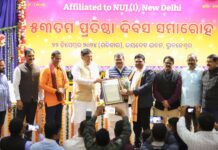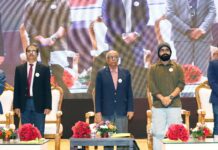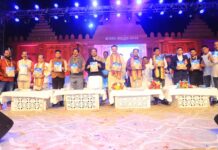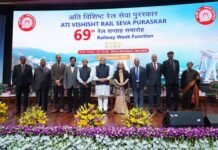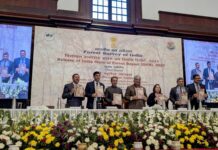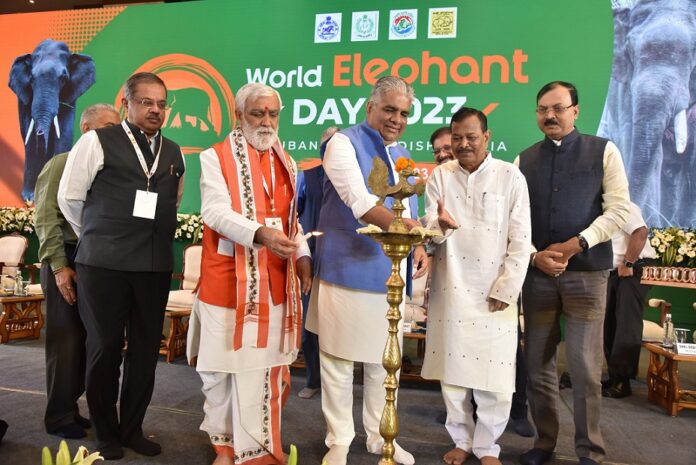
By Our Correspondent
BHUBANESWAR: Union Minister of Environment, Forest and Climate Change and Labour and Employment Shri. Bhupender Yadav has emphasised on mainstreaming biodiversity conservation in India’s economic development to ensure ecological wellbeing and sustainability.
Addressing the gathering on the occasion of World elephant day in Bhubaneswar on Saturday he said with the largest population of wild Asian elephants, India is the mainstay for long-term conservation of the species. He insisted that active participation with local communities is the key in steering elephant conservation to new heights. Shri Yadav said the Ministry is committed to reconciling human welfare and elephant conservation.
The Minister highlighted the concerted efforts taken by the Ministry of Environment, Forest and Climate Change( MoEFCC), Ministry of Railways, the State Forest Departments, and the National Institutions like the Wildlife Institute of India to address the critical issue of Railway-related elephant collisions. As part of these efforts, about 110 critical stretches across the Railway network in the country that pass through elephant habitats have been identified. Shri Yadav said in these critical stretches, multipronged strategies are planned to minimize Railway-related elephant collisions.
He said in these locations measures such as building underpasses, clearing vegetation along the tracks to increase visibility for the loco pilots to avoid collisions, provisioning ramps, and others will also be taken up. The Minister mentioned that the Ministry of Railways is contemplating to replicate the technology based intrusion detection system along the tracks in Odisha and other States in the country.
Shri Yadav highlighted the novel initiative taken by the Ministry to map genotype of all captive elephants in the country to prevent illegal trafficking of elephants.
The Minister said that for the first time ever, the Ministry has embarked on carrying out management effectiveness and evaluation of the Elephant Reserves across the country. He said Four elephant reserves across the four elephant bearing regions of the country have been identified for piloting the process of management effectiveness evaluation for the Elephant Reserves. The Minister said this will be a major step forward in standardizing and propagating best practices among the Elephant Reserves. He further informed that the Elephant Reserve network in the country increased from 76,508 km2 to 80,777 km2 comprising of 33 Elephant Reserves during the last two years.
Following the keynote address, the Shri Yadav interacted with the Gaj Saathi and other frontline staff who are in the forefront of managing human – elephant conflict.
As part of the world elephant day celebrations, the Minister released the report on the Elephant Corridors of India prepared by the Project Elephant. The report is an outcome of ground-validation of all the indentified elephant corridors in India in coordination with the State Forest Departments of the elephant range states. The report involves nearly two years of concerted efforts. The report comprises of details pertaining to 150 elephant corridors across India with corresponding maps.
The report is intended to serve as an important reference manual for the elephant corridors of India. The report would help the State Governments in taking appropriate measures to manage and protect these corridors for ensuring unhindered movement of elephants to avoid negative interactions with local people.Shri Yadav also released the second version of the Atlas of Elephant Reserves of India, which is intended to provide basic information on all the 33 Elephant Reserves of India.
The Minister conferred the Gaj Gaurav awards to the awardees for their exemplary contributions in the field of elephant conservation and management. During the event, the prestigious Gaj Gaurav awards were conferred to (1) Alefnagar Joint Forest Management Committee, West Bengal (2) (Late) Shri. Bishwarrajan Panigrahi, (ex) protection squad in the Dhenkanal range of Odisha for his exemplary services (3) Shri. Pitambara Gouda, watcher, elephant squad of Rayagada Forest Division in Koraput circle of Odisha, (4) Shri. Deepak Sharma, Forest Guard, Assistant Gaj Yatra Team, Mahasamund Forest Division, Chhattisgarh, and (5) Dr.Mirza Vaseem, veterinary officer, Bandipur Tiger Reserve, Karnataka.
The occasion was graced by Shri. Ashwini Kumar Choubey, Minister of State, Government of India and Shri. Pradip Kumar Amat, Minister, FE and CC, Government of Odisha and. Senior officials from the MoEFCC including the Director General of Forests and Special Secretary Shri. Chandra Prakash Goyal and Additional Director General (PT & E) and Member Secretary (NTCA) Dr. Satya Prakash Yadav were present on the occasion. The Additional Chief Secretary, FE & CC, Government of Odisha Shri. Satyabrata Sahu and the Chief Wildlife Warden of Odisha Shri. Sushil Kumar Popli and senior officials from the State Forest Department alongwith forest officials including the Chief Wildlife Wardens from different elephant range states, renowned elephant experts, and representatives from local communities were also present during the event.
The 19th Steering Committee Meeting of the Project Elephant under the Chairmanship of Shri Yadav was held after the world elephant day celebrations during which the current issues facing elephant conservation and management were deliberated at length.
Every year 12th August is celebrated as the world elephant day across the globe to reaffirm mankind’s collective pledge in conserving one of the most iconic species in the planet. In India, elephants are regarded as the National Heritage animals and are deeply ingrained in our culture.




